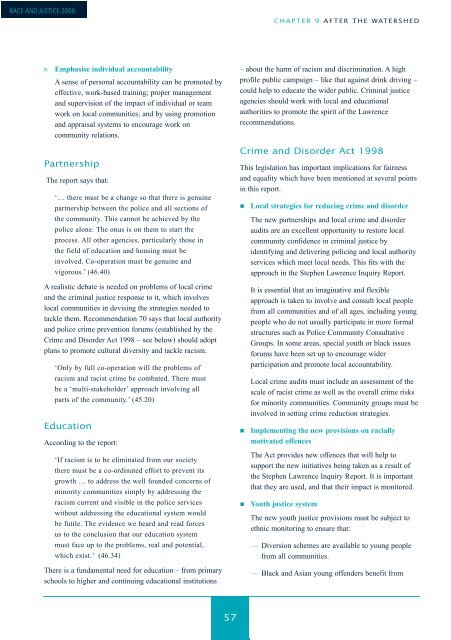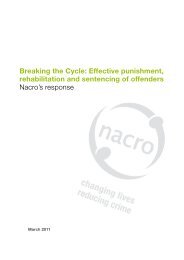Let's get it right: race and justice 2000 - Nacro
Let's get it right: race and justice 2000 - Nacro
Let's get it right: race and justice 2000 - Nacro
- No tags were found...
You also want an ePaper? Increase the reach of your titles
YUMPU automatically turns print PDFs into web optimized ePapers that Google loves.
RACE AND JUSTICE <strong>2000</strong>CHAPTER 9 AFTER THE WATERSHEDnEmphasise individual accountabil<strong>it</strong>yA sense of personal accountabil<strong>it</strong>y can be promoted byeffective, work-based training; proper management<strong>and</strong> supervision of the impact of individual or teamwork on local commun<strong>it</strong>ies; <strong>and</strong> by using promotion<strong>and</strong> appraisal systems to encourage work oncommun<strong>it</strong>y relations.– about the harm of racism <strong>and</strong> discrimination. A highprofile public campaign – like that against drink driving –could help to educate the wider public. Criminal <strong>justice</strong>agencies should work w<strong>it</strong>h local <strong>and</strong> educationalauthor<strong>it</strong>ies to promote the spir<strong>it</strong> of the Lawrencerecommendations.PartnershipThe report says that:‘… there must be a change so that there is genuinepartnership between the police <strong>and</strong> all sections ofthe commun<strong>it</strong>y. This cannot be achieved by thepolice alone. The onus is on them to start theprocess. All other agencies, particularly those inthe field of education <strong>and</strong> housing must beinvolved. Co-operation must be genuine <strong>and</strong>vigorous.’ (46.40)Crime <strong>and</strong> Disorder Act 1998This legislation has important implications for fairness<strong>and</strong> equal<strong>it</strong>y which have been mentioned at several pointsin this report.Local strategies for reducing crime <strong>and</strong> disorderThe new partnerships <strong>and</strong> local crime <strong>and</strong> disorderaud<strong>it</strong>s are an excellent opportun<strong>it</strong>y to restore localcommun<strong>it</strong>y confidence in criminal <strong>justice</strong> byidentifying <strong>and</strong> delivering policing <strong>and</strong> local author<strong>it</strong>yservices which meet local needs. This f<strong>it</strong>s w<strong>it</strong>h theapproach in the Stephen Lawrence Inquiry Report.A realistic debate is needed on problems of local crime<strong>and</strong> the criminal <strong>justice</strong> response to <strong>it</strong>, which involveslocal commun<strong>it</strong>ies in devising the strategies needed totackle them. Recommendation 70 says that local author<strong>it</strong>y<strong>and</strong> police crime prevention forums (established by theCrime <strong>and</strong> Disorder Act 1998 – see below) should adoptplans to promote cultural divers<strong>it</strong>y <strong>and</strong> tackle racism.‘Only by full co-operation will the problems ofracism <strong>and</strong> racist crime be combated. There mustbe a ‘multi-stakeholder’ approach involving allparts of the commun<strong>it</strong>y.’ (45.20)EducationAccording to the report:‘If racism is to be eliminated from our societythere must be a co-ordinated effort to prevent <strong>it</strong>sgrowth … to address the well founded concerns ofminor<strong>it</strong>y commun<strong>it</strong>ies simply by addressing theracism current <strong>and</strong> visible in the police servicesw<strong>it</strong>hout addressing the educational system wouldbe futile. The evidence we heard <strong>and</strong> read forcesus to the conclusion that our education systemmust face up to the problems, real <strong>and</strong> potential,which exist.’ (46.34)There is a fundamental need for education – from primaryschools to higher <strong>and</strong> continuing educational inst<strong>it</strong>utionsIt is essential that an imaginative <strong>and</strong> flexibleapproach is taken to involve <strong>and</strong> consult local peoplefrom all commun<strong>it</strong>ies <strong>and</strong> of all ages, including youngpeople who do not usually participate in more formalstructures such as Police Commun<strong>it</strong>y ConsultativeGroups. In some areas, special youth or black issuesforums have been set up to encourage widerparticipation <strong>and</strong> promote local accountabil<strong>it</strong>y.Local crime aud<strong>it</strong>s must include an assessment of thescale of racist crime as well as the overall crime risksfor minor<strong>it</strong>y commun<strong>it</strong>ies. Commun<strong>it</strong>y groups must beinvolved in setting crime reduction strategies.Implementing the new provisions on raciallymotivated offencesThe Act provides new offences that will help tosupport the new in<strong>it</strong>iatives being taken as a result ofthe Stephen Lawrence Inquiry Report. It is importantthat they are used, <strong>and</strong> that their impact is mon<strong>it</strong>ored.Youth <strong>justice</strong> systemThe new youth <strong>justice</strong> provisions must be subject toethnic mon<strong>it</strong>oring to ensure that:— Diversion schemes are available to young peoplefrom all commun<strong>it</strong>ies.— Black <strong>and</strong> Asian young offenders benef<strong>it</strong> from57

















